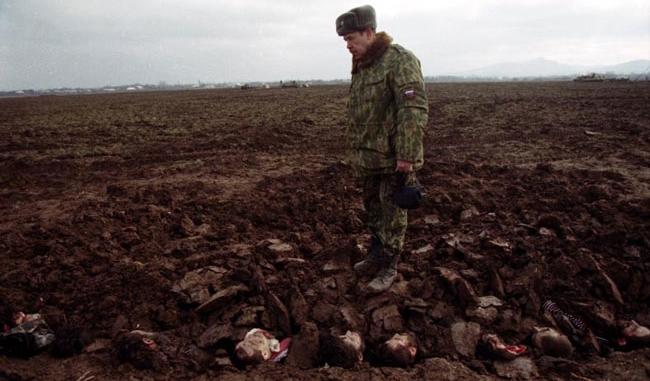Authors:
Historic Era: Era 10: Contemporary United States (1968 to the present)
Historic Theme:
Subject:
Spring 2022 | Volume 67, Issue 2


Authors:
Historic Era: Era 10: Contemporary United States (1968 to the present)
Historic Theme:
Subject:
Spring 2022 | Volume 67, Issue 2

Editor’s Note: Russian troops tortured journalist Anna Politkovskaya for her writings about the suffering of Chechnyan civilians. In 2006 she was shot dead in an elevator in her Moscow apartment building. Some of Politkovskaya's vivid accounts of the horror wrought by Russia’s two wars in the mostly Muslim province were compiled in A Small Corner of Hell: Dispatches from Chechnya, translated by Alexander Burry and Tatiana Tulchinsky (University of Chicago Press). Politkovskaya was highly critical of Putin’s actions and those of the pro-Moscow dictator Akhmad Kadyrov and his son Ramzan.
The war began the way wars usually do, with the bombing of villages and cities, which led to torrents of refugees. Thousands of people, grabbing their children and elderly, fled wherever their feet would carry them. They were coming and going every which way, a trail of people many miles long following the main highway of Chechnya, the Rostov-Baku Federal Route. But this trail got bombed too.
September 1999. We are lying on withered autumn grass. To be more precise, we want to lie on it, but for most of us, all that’s left is the dusty Chechen ground. There are too many of us – hundreds, and there are not enough amenities for everyone.
We are the people caught in the bombing. We didn’t do anything wrong; we were just walking toward Ingushetia along the former highway, which is now all torn up by armored vehicles.
Grozny is behind us. We run as a herd from the war and its battles. When the time comes, and you have hit the ground face down, assuming a fetal position, trying to hide your head, knees, and even elbows under your body – then a kind of false, sticky loneliness sneaks up on you, and you start to think: “Why are you crouching? What are you trying to save? This life of yours that no one but you cares about?”
Why is it false? Because you know perfectly well that this isn’t really true: You have a family, and they are waiting and praying for you. And it’s sticky because of the sweat. When you’re clinging to life, you sweat a lot. Some people are lucky, though. When they feel that death is near, all that happens is that the hair rises on their heads.
Still, there is loneliness. Death is the one situation where you can never find companionship. When the diving helicopters hover over your bent back, the ground starts to resemble a death bed.
Here are the helicopters, going for another round. They fly so low that you can see the gunners’ hands and faces. Some say that they can even see their eyes. But this is fear talking. The main thing is their legs, dangling carelessly in the open hatches. As if they didn’t come to